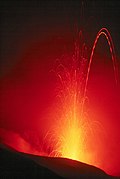Volcanology
In geology, volcanology (also spelled vulcanology) is the part of geology that studies volcanoes, lava, magma, and other related things. The term volcanology comes from the Latin word vulcan, the Roman god of fire.
A volcanologist is a person who studies volcanoes and their eruptions. Volcanologists visit volcanoes often, especially active ones. This makes it a dangerous science. They analyze physical and chemical variations related to historical and current activity of the volcanoes.
Volcanologists look at volcanic eruptions, collect material from the eruptions, such as ash or pumice, rock and lava samples.
Volcanology Media
A volcanologist sampling lava using a rock hammer and a bucket of water
Eruption of Stromboli (Isole Eolie/Italia), ca. 100m (300ft) vertically. Exposure of several seconds. The dashed trajectories are the result of lava pieces with a bright hot side and a cool dark side rotating in mid-air.
A diagram of a destructive plate margin, where subduction fuels volcanic activity
Eruption of Vesuvius in 1822. The eruption of CE 79 would have appeared very similar.
After the first eruption of Mount St. Helens on May 18, five more explosive eruptions occurred in 1980, including this event on July 22. This eruption sent pumice and ash 6 to 11 miles (10-18 kilometers) into the air, and was visible in Seattle, Washington, 100 miles (160 kilometers) to the north. The view here is from the south.
- 1775 volcan Pacaya Guatemala.jpg
Spanish depiction of a volcanic eruption in Guatemala, 1775.
Other websites
- Area Vesuvio Archived 2016-03-03 at the Wayback Machine
- European Volcanological Society
- United States Geologic Survey- Volcanic Hazards Program
- Volcano Live- What is a volcanologist? Archived 2012-11-26 at the Wayback Machine
- VolcanoWorld- How to become a volcanologist Archived 2008-07-08 at the Wayback Machine

